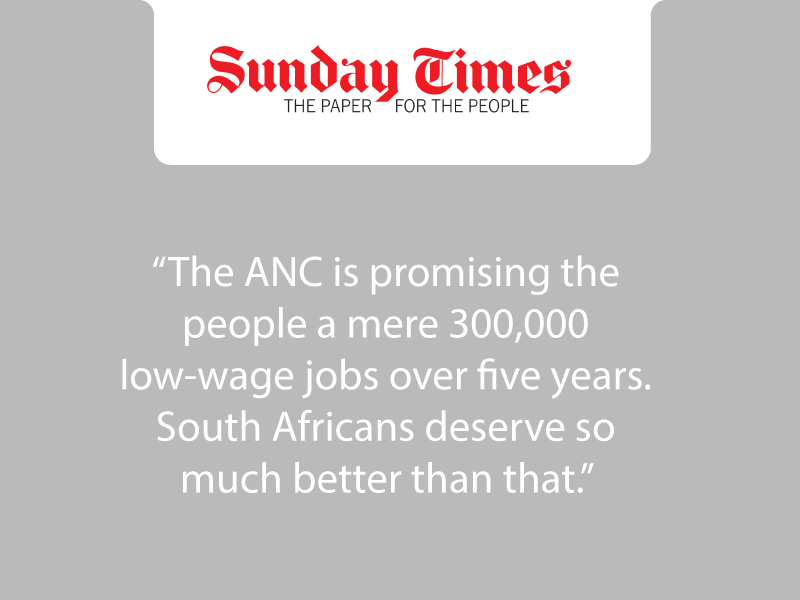 Government’s job-creation project has pay flexibility, so it makes no sense to exclude private sector’s efforts, write Nicoli Nattrass and Jeremy Seekings.
Government’s job-creation project has pay flexibility, so it makes no sense to exclude private sector’s efforts, write Nicoli Nattrass and Jeremy Seekings.
SA’s extremely high unemployment means inclusive development is impossible without labour-intensive growth. When nearly two adults in five are unemployed, the expansion of jobs, even at relatively low wages, reduces poverty and inequality.
SA’s development strategy rests on the false hope that an increasingly skill- and capital-intensive economy can generate such high growth that unemployment falls. In fact, the economy has grown by less than 3% per year since 1994 and growth is generating fewer and fewer new jobs. It is time to change direction. This means learning from the experience of the many countries that have industrialised through labour-intensive manufacturing.
In China, production for export generated 5.5-million clothing jobs by the mid-2000s. Bangladesh grew the number of clothing jobs from 1-million in the mid-1990s to more than 4-million today by taking advantage of rising wages in China. The clothing industries in Cambodia, Vietnam and Burma also employ huge numbers of workers. Clothing jobs are still leaving China. Countries such as Ethiopia and Madagascar are taking advantage of this. SA should start competing for these jobs too.
It is widely assumed in SA that encouraging the growth of labour-intensive firms that pay lower wages necessarily threatens higher-wage, higher-productivity firms, spurring a “race to the bottom”.
This view is mistaken because firms paying different wages can coexist in the same industry by using different technologies and producing different items for different markets. It is possible, for example, to expand the production of work overalls in lower-wage, labour-intensive clothing factories without affecting jobs in higher-wage firms producing more expensive and sophisticated fashion items. Setting minimum wages at a level that only the sophisticated firm can afford simply rules out labour-intensive development without necessarily improving the position of workers in high-end firms.
Wages matter for employment. In post-apartheid SA rapidly rising minimum wages in clothing (and in agriculture) have demonstrably destroyed jobs. The new national minimum wage (of R20 an hour) in effect rules out any significant labour-intensive growth and threatens jobs (including in the clothing industry) in the poorest parts of the country.
The minimum wage setting system needs to be modified. The national minimum wage already makes time-bound exemptions for agriculture and domestic work. It also allows an exception for the government’s expanded public works programme (EPWP), setting a minimum of R11 an hour. This exemption could become the effective minimum wage floor across the economy — with subsequent adjustments being made to it by the Employment Conditions Commission after due consideration of any potential employment effects.
It makes no sense to exempt the government’s employment creation programme without exempting private sector efforts to generate jobs suitable for relatively unskilled people on a large scale. Bargaining councils can continue to set minimum wages above this floor, but these should not be automatically extended to nonparties, which tend to be smaller, less capital-intensive firms.
There are no simple solutions to economic development, but where wages are appropriate and an effort is made to attract investors from countries with experience in labour-intensive development, significant job creation can result. Newcastle in northern KwaZulu-Natal is a case in point. In the early 1980s, the municipality encouraged East Asian manufacturers to relocate to Newcastle, efforts that were supported by industrial policy incentives. Ten years later, Newcastle had 1,000 Chinese residents and 54 large Chinese-owned factories providing thousands of jobs, mainly in the clothing industry.
The industry contracted in the 1990s and 2000s as a result of trade liberalisation, currency volatility and rising minimum wages. A tough back-bone of Chinese-owned labour-intensive firms continued to compete successfully against imports from low-wage countries, but only by paying below the industry’s minimum wages. Rather than harassing these firms into closure, we should explicitly allow lower wages in these labour-intensive firms. Industrial policy should support them to compete against imports and grow into export markets — which some firms in Newcastle were able to do at one point in their history.
The key challenge for such a proposal is political: organised labour (backed by some employers) is opposed to greater wage flexibility and is suspicious of development approaches based on labour-intensive growth. This is both an ideological preference and a self-interested position because trade unions in SA represent relatively well-paid workers, mostly in nontraded sectors, and have no direct interest in expanding lower-wage jobs.
A commission of inquiry might be set up to investigate how best to promote labour-intensive development, either through amending wage-setting machinery at a national level or restricting downward flexibility to special economic zones (SEZs). It should include representatives from municipalities that stand to benefit from the expansion of labour-intensive employment (including new SEZs or existing capacity in places such as Coega in the Eastern Cape). A great effort should be made to include the voices of the unemployed who are marginalised from bargaining councils, Nedlac and political structures.
Greater minimum wage flexibility is neither a necessary nor sufficient solution to SA’s growth crisis. It is necessary, however, if the economy is to become more labour-intensive and hence more inclusive.
This is not an argument against minimum wages in general or against health and safety regulations, all of which are important. Rather, it is an argument that we need to set minimum wages at different levels for different sectors and allow wages that are appropriate for the expansion of labour-intensive jobs. Additional support could also be provided for the growing numbers of worker co-operatives in the clothing industry.
Given inadequate welfare support for the unemployed, the expansion of lower-wage, labour-intensive sectors will have a significant effect in terms of reducing poverty and inequality. Where this is linked to SEZs, nonwage benefits could potentially include better housing, schooling and access to clinics.
• Natrass and Seekings are professors at the University of Cape Town. This article is based on a Centre for Development and Enterprise publication, Viewpoints.




